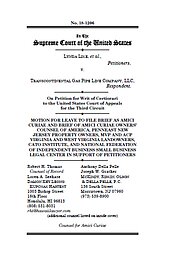Learn more about Cato’s Amicus Briefs Program.
Lynda Like inherited farmland from her father in rural Lancaster County, Pennsylvania. She promised her father that she would preserve it for her family and allow her sons to build homes there when they eventually reached adulthood. Now, part of her land has been taken over by the Transcontinental Gas Pipe Line Company, which received authorization from the government to take her land for a gas pipe line but has not yet paid her compensation as the Constitution requires.
Under the Natural Gas Act, private companies are granted the power to bring a condemnation lawsuit and then buy the land at an adjudicated price after final judgment. In this case, however, the district court entered a preliminary injunction giving Transcontinental immediate possession of land before reaching final judgment and before giving any compensation. Allowing courts to use preliminary injunctions to transfer property without compensation violates longstanding principles of eminent domain law, and Lynda Like and other property owners—represented by our friends at the Institute for Justice—are asking the Supreme Court to hear their case.
Cato has joined Owners’ Counsel of America, PennEast New Jersey Property Owners, MVP and ACP Virginia and West Virginia Property Owners (a group of owners who are suffering from a similar problem), and the National Federation for Independent Business in filing a brief in support of the landowners. We argue that the case presents fundamental questions about the delegated power of eminent domain, separation of powers, and whether the courts can use their equitable powers to rearrange the substantive rights of landowners.
The substantive right at stake in all federal takings, these included, is ownership of the property. And in “straight takings,” such as this, ownership and title are transferred only after parties agree to the adjudicated price and the plaintiff exercises its option to buy at that price. Only then may the condemnor obtain possession.
But the Third Circuit erred in concluding that the district court’s summary judgment order granted Transcontinental a substantive right to petitioners’ properties. And because of the misuse of a preliminary injunction, Transcontinental possesses both its cake (prejudgment possession of the properties), and the ability to eat it (the option to not buy if it doesn’t like the final price).
This issue is not confined to Lynda Like and the other petitioners, as can be seen by the similarly affected property owners who joined Cato on the brief. Because the problem is nationwide, the Supreme Court should take the case to clarify whether a court can use its equitable powers to transfer property.
